During Advance CTE’s 2023 Fall Meeting, four members of the second cohort of the 15-month Postsecondary State Career Technical Education Leaders Fellowship at Advance CTE – Sponsored by ECMC Foundation participated in a panel discussion to share their experiences and knowledge gained from the Fellowship, as well how state Career Technical Education (CTE) leaders can remove barriers for diverse aspiring postsecondary leaders.
Jomarie Coloriano – Inclusive Excellence, Director | Office of Diversity, Equity and Inclusion, Wisconsin
Dr. Crystal Gardner – Program Director | Workforce Instruction, Workforce Research and Development | Houston Community College, Texas
Dr. Angela Lawhorne – Director of Career Education Programs & Workforce Partnerships | Virginia Community College System, Virginia
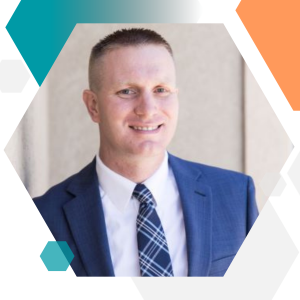
Caleb Perriton – Program Director | Trades and Technical Studies | Laramie County Community College, Wyoming
Fellows shared their reasons for applying to the Fellowship, which ranged from seeking out leadership opportunities to advance at their current institution to being forwarded the application by a colleague or a supervisor who believed and supported their leadership aspirations. A common theme shared by each was the desire to address a specific concern related to policy and processes within postsecondary Career Technical Education (CTE). The application for the Fellowship included a question on future goals and a challenge related to equity and a population of learners applicants wanted to research and develop an intervention for while completing the Fellowship. The Fellows pointed to the intentionality of explicitly requiring applicants to reflect on and consider CTE leadership opportunities and the inclusion of an equity-based real-world project made the decision to apply an easy choice.
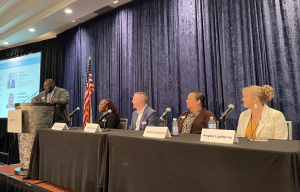 Fellows were also asked to share the key event or events that reinforced their decision to apply to the Fellowship, in other words – when they knew they made the right decision. Dr. Gardner shared that in CTE she rarely has an opportunity to work with or collaborate with other leaders of color across the nation and view the entire landscape of leadership possibilities in postsecondary CTE. The Fellowship offered an opportunity to build a network consisting of her peers, guest speakers invited to the Fellowship workshop and most importantly her coach whom she felt she was perfectly matched with based on their commonalities and interests. She recognized the level of thought the Advance CTE staff dedicated to finding the right mentor for each of the Fellows. Caleb discussed being paired with a postsecondary administrator with an automotive background and how the monthly coaching meetings inspired him to begin seeking the director position he currently holds at his institution.
Fellows were also asked to share the key event or events that reinforced their decision to apply to the Fellowship, in other words – when they knew they made the right decision. Dr. Gardner shared that in CTE she rarely has an opportunity to work with or collaborate with other leaders of color across the nation and view the entire landscape of leadership possibilities in postsecondary CTE. The Fellowship offered an opportunity to build a network consisting of her peers, guest speakers invited to the Fellowship workshop and most importantly her coach whom she felt she was perfectly matched with based on their commonalities and interests. She recognized the level of thought the Advance CTE staff dedicated to finding the right mentor for each of the Fellows. Caleb discussed being paired with a postsecondary administrator with an automotive background and how the monthly coaching meetings inspired him to begin seeking the director position he currently holds at his institution.
Each of the Fellows discussed the impact of their real-world project and the effect of completing the project has had on their current work and aspirations to continue climbing the postsecondary CTE leadership ladder. Dr Lawhorne’s project focused on improving access to justice-involved learners in Virginia and the state’s current efforts to expand, through the community college system, access to high-quality CTE programming. In the process of completing her project, an award of $70,000 was granted to support the project which allowed for the inclusion of other correctional facilities in the intervention strategy being implemented at a few select sites in the state.
As part of Jomarie Coloriano’s project research on providing information on and access to wrap-around services for economically disadvantaged learners in her region of the Wisconsin Technical College System, she conducted a focus group which led to the identification of learner needs. This work led to an advancement to director as she continues to complete her doctoral program and the continuation of her research on increasing the postsecondary outcomes of economically disadvantaged learners. Jomarie shared during the panel discussion, “my mentor has really pushed me as a college student, first generation professional, now a doctoral student and pioneer for my family.”
This panel allowed CTE leaders to see the impact and influence of leadership development programs. Caleb shared with the state leaders that “there’s work that needs to be done in your state, and this Fellowship was the catalyst to complete a project that was needed in my community.” State and local CTE leaders can use Advance CTE’s new Building a Diverse CTE Leadership Pipeline Toolkit, to assess and build leadership development structures in their own institutions. The resource includes an overview of lessons learned from the Fellowship as well as a guidebook and accompanying workbook to assess and build leadership development structures.
Dr. Kevin Johnson, Senior Advisor


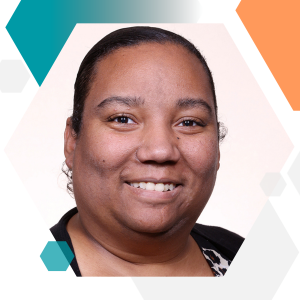
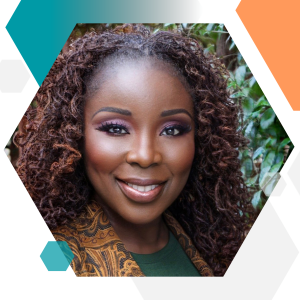

 Administration of a CTE program with an equity lens begins with ensuring all learners have meaningful access to and substantial engagement in high-quality CTE programming which requires making these actions a priority. Ohio has created and applied equity-minded leadership principles within
Administration of a CTE program with an equity lens begins with ensuring all learners have meaningful access to and substantial engagement in high-quality CTE programming which requires making these actions a priority. Ohio has created and applied equity-minded leadership principles within  The application of equity-minded principles isn’t a one-time occurrence. It requires an ongoing systematic review of policies, practices and data to determine the effectiveness of the mitigating or transformational strategies being applied. Indiana engaged in this process by conducting a review of the CTE equity labs being offered in their state and using additional resources to measure goal attainment and to provide additional supports to local leaders.
The application of equity-minded principles isn’t a one-time occurrence. It requires an ongoing systematic review of policies, practices and data to determine the effectiveness of the mitigating or transformational strategies being applied. Indiana engaged in this process by conducting a review of the CTE equity labs being offered in their state and using additional resources to measure goal attainment and to provide additional supports to local leaders. 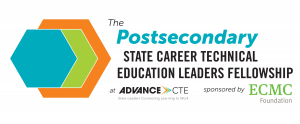
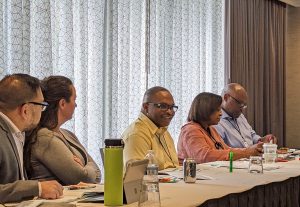
 Dr. Crystal Gardner currently serves as the Instructional Supervisor for the Houston Community College (HCC) Alternative Teacher Certification Program (ATCP). In this role, she oversees instructional operations, program development, quality control, and compliance management. Joining the Fellowship was an exciting opportunity to fully immerse herself in the world of career and technical education (CTE) through equity-aligned learning and real-world practicum.
Dr. Crystal Gardner currently serves as the Instructional Supervisor for the Houston Community College (HCC) Alternative Teacher Certification Program (ATCP). In this role, she oversees instructional operations, program development, quality control, and compliance management. Joining the Fellowship was an exciting opportunity to fully immerse herself in the world of career and technical education (CTE) through equity-aligned learning and real-world practicum. “As a lifelong learner, I’ve always been intentional in my pursuit of professional development and growth in my career.”
“As a lifelong learner, I’ve always been intentional in my pursuit of professional development and growth in my career.”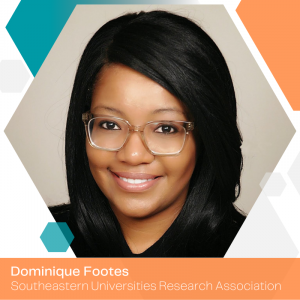 Tell me more about your journey to the Fellowship.
Tell me more about your journey to the Fellowship.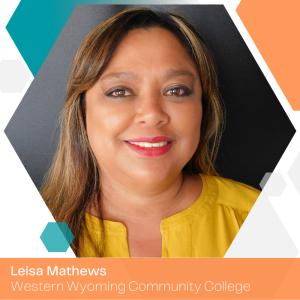 Tell us about your journey to the Fellowship.
Tell us about your journey to the Fellowship.